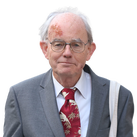A noose about the neck of secrecy: Chris Mullin says people in public office should be required by law to declare their membership of masonic and other societies

SOME years ago, during the course of his campaign to clean up the Metropolitan Police, the Commissioner - Sir Kenneth Newman - published a document entitled The Principles of Policing and Guidance for Professional Behaviour.
It included a lengthy passage on the merits and otherwise of freemasonry. With masterly understatement it went on: 'Although an officer who is a freemason may take great care to ensure that membership does not influence him in the exercise of his police powers, he may find it impossible to convince a member of the public, or a colleague who is not a freemason, that this is so.'
It concluded: 'The discerning officer will probably consider it wise to forgo the prospect of pleasure and social advantage in freemasonry so as to enjoy the unreserved regard of all those around him.'
The freemasons in the Met responded robustly. In open defiance of Sir Kenneth they set up a new lodge, the Manor of St James, membership of which included some of the most senior policemen in London.
A great deal of paranoia surrounds freemasonry and I have no wish to add to it. However, anyone who has confronted, as I have, the highest levels of the police and judiciary would have to be blind not to notice that they contain an uncommonly large number of freemasons. The same is true of many walks of public life, not least in Sunderland - which I represent in Parliament.
Some months ago I came into possession of the 1991 Masonic Handbook for Co Durham (based on the old boundaries, which included Sunderland). The handbook is small and very thick. Although not exactly secret, it is not readily available to non-masons. It lists all the lodges in Co Durham and also the names of the principal officers and former masters of each lodge.
In Sunderland we have 29 lodges with a total of 1,597 members. There are also various other masonic bodies, with exotic names such as the Royal and Select Masters, the Harte Conclave and the Order of the Secret Monitor.
We have a Civic Centre Lodge - no 5841. It has 62 members and meets at the masonic temple conveniently situated less then 100 yards from the front door of the Civic Centre.
Although the names listed in the handbook amount to only about 10 per cent of the total local membership, I see a number of familiar names: a former chief executive, a former Tory leader of the council, former directors of housing and architecture, a former deputy director of social services. In an earlier handbook I see a man who was until recently deputy director of planning. I see local policemen, magistrates, consultants - even a consultant whose wife is a magistrate.
I make no allegations. For all I know these may be people of the highest integrity whose every waking hour is devoted to good works. Like Sir Kenneth Newman, however, I wonder whether it is wise for persons whose work requires that they enjoy public confidence to be members of a secret society, one of the aims of which is mutual self-advancement.
Masonic secrecy is reinforced by a series of bloodcurdling oaths administered at bizarre ceremonies in which candidates are, or were until recently, bare-breasted, with nooses about their necks. Defenders argue, of course, that all this is just a bit of harmless fun and that their objectives are primarily
social, and even charitable.
Personally I have no strong feelings. If grown men wish to bare their breasts, wear aprons and indulge in strange rituals, that is entirely a matter for them. It is the secrecy I object to.
There are said to be about 500,000 masons in Britain. Many of these men - they are all men, of course - hold public office, wielding power over the lives of others.
A number of senior masons have expressed a desire to make their organisation more open. To this end cameras were admitted to the recent anniversary knees-up at Olympia. Something more is called for, however.
If they wish to allay public suspicion, freemasons must do away with the obsessive secrecy that surrounds their organisation.
My Bill will require all those who hold public office, elected or appointed, to declare membership of secret societies. It will apply not only to freemasons, but to any other secret society.
The record of their declaration must be available for inspection by the public, in the same way that MPs and councillors are already obliged to declare their commercial interests.
For those who argue that this could lead to discrimination against freemasons, I propose to include a clause outlawing discrimination as a result of any declaration made under the Bill.
My Bill is based on the principle that membership of a secret society is incompatible with public office in a modern democracy.
I anticipate that it will have the support of people of all political persuasions who care about the integrity of public life. I hope it will also enjoy the support of honest freemasons everywhere.
The author is the MP for Sunderland South. His Secret Societies Bill will be introduced today.
Join our commenting forum
Join thought-provoking conversations, follow other Independent readers and see their replies
Comments